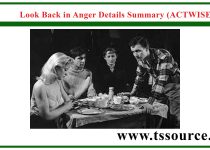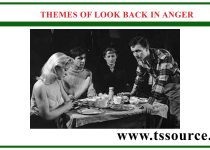LOOK BACK IN ANGER: THE DARK COMEDY
CHAPTER 10
LOOK BACK IN ANGER: THE DARK COMEDY
Some plays are formally comedies but so dark in tone that they are more often classified as ‘problem plays’. These types of plays are known as dark comedies.
This species of comedy is so called because of an element of cyni ism and bitterness in it. Shakespeare’s Measure for Measure and Troilus and Cressida are the best examples of dark comedies. Both these plays are cynical and bitter and hence are the darker side of comedy. In plays like Moliere’s Tarluffe, Ibsen’s An Enemy of the People, and Shaw’s Mrs. Warren’s Profession, the darker side of comedies are presented. The fifties and sixties of the twentieth century witnessed more examples of dark comedies in the work of a number of playwrights.
Look Back in Anger as a Dark Comedy Look Back in Anger can be categorised as a dark comedy as it has
the elements of bitterness and cynicism and presents the darker side of life. The hero Jimmy Porter the self proclaimed representative of the youths victimised by the British social set up, through his bitter com- ments mocks at the contemporary society, making fun of people and institutions. We can perceive his intelligence in the witty comments he makes. His wit is marked by sarcasm and bitterness. We get the best example of his bitter wit against Alison and her family. Unable to se- cure a suitable job despite his university degree, he feels society has been cruel to him, that he has been deprived of his rights because of his low origin. So he wages a war of contempt against those belonging to higher social hierarchy. In this war he holds Alison as a “hostage” and joints hands with Hugh in debunking and desecrating upper class gath- erings. Alison tells Helena about this: “They both came to regard me as a sort of hostage from those sections of society they had declared war on. His denunciation of Alison’s motner has a touch of bitter humour. His attack on his mother-in-law… She’d bellow like a rhinoceros in labour-enough to make every male rhino for miles turn white, and pledge himself to celibacy” is a humorous piece enough to irritate Alison and other character, and to bring smile if not laughter to the audience. Through comic elements the darker side of life is presented in the play. He mocks at the religious practices of people like sacrificing animals and offering their blood to the Coptic goddess of fertility etc.
- Act II Sc. I Page 87
- Act. II Sc. I Page 96
- Act II Sc. I Page 120
92
LOOK BACK IN ANGER: A CRITICAL EVALUATION
New Kind of Drama Started by Osborne and his Contemporary The staging of Osborne’s Look Back in Anger heralded the begin
ning of new age in the history of English drama. It no longer seemed possible to keep the old distinction between tragedy and comedy-a distinction that always seemed unreal though convenient for the pur pose of literary history. Osborne started his career as an actor before becoming a dramatist. He had two historical plays Luther and A Patriot for me to his credit and dark comedies like Epitaph for George Dills (written in collaboration with Anthony Creighton). The Entertainer, and Inadmissible Evidence. Look Back in Anger is an important landmarks for Osborne because it introduced a new kind of drama to the English stage, not because it was a better play than his earlier works. It is a comedy but it cannot be categorised with the comedies of Sheridan or Wide. Neither can it be labelled with the artificial drawing room com edies that have always been popular in the commercial theatre. The theme of this play Look Back in Anger is basically the hidden class-war between those who have grown up in comfortable middle-class homes, and those who have fought their way up the social ladder by their hard work and intelligence. In this play Osborne presents the story of a young man of the latter type and his wife-a girl of equal intelligence of higher social class who is unable to understand his anger and frustration.
The Angry Young Man
The popularity with Look Back in Anger the phrase “angry young man” was in vogue. This phrase came to be associated with those who, like Osborne were unhappy with the injustice and inequality which seemed to loom large in British despite the recent “Victory for democ racy” in the World War II.
The Kitchen Sink Drama
Another phrase that was coined with the emergence of the new kind of drama is “the kitchen-sink drama”. This popular phrase came to be associated with those who did not care for plays like Look Back in Anger and who perhaps saw the dark comedy of the time as a sign of imminent social revolution. This phrase could be applied to the work of Arnold Wesker, a dramatist. Wesker’s play The Kitchen was actually set in the kitchen of a London restaurant and showed the relation both tragic and comic among the people working there. Wesker was the most important dark comedy writer with the exception of Harold Pinter. His three plays Chicken soup with Barly, Roots, and I’m talking About Jerusalem were started in the 1950’s and are concerned with the same Jewish family from the East end of London. The trilogy shows a group of people who were basically loving and idealistic, trying in a small way to improve the world and build a better life for themselves, but are defeated and frustrated by the harsh realties of life and human nature. The three plays have that unusual mixture of comedy and tragedy, social conscious
LOOK BACK IN ANGER: THE DARK COMEDY
93
Bass and human warmth, which are found in great writer like Chaucer, Shakespeare and Dickens.
The Theatre of The Absurd
Eugene Lonesco and Samuel Beckett were the pioneer of “the theatric of the absurd” Beckett, an Irishman, lived in pains for many years and wrote most of his plays in French. One of them translated the version of Waiting for Godot was performed in London in the 1950’s. Although the evidence found it puzzling, it was extremely successful and established Backett as one of the chief influence in the English experimental the- atre for an ordinary reader it is difficult to comprehend Backett’s plays. In Endgame the characters live in dustbins, and the audience see only their heads and shoulders. In another play Happy Days the woman who is the only speaking character is slowly buried in sand until, at the end of the play her head is visible. In yet another play Come and Go (which
lasts for three minutes) there is no action, and only 121 words. Apart from Beckett, the other writer of the ‘theatre of the absurd” were Harold Pinter (The Birthday Party), N. F. Simpson (A Resounding Tinkle), the American dramatist Edward Albee (Who’s Afraid of Vir ginia Woolf?), and Tom Stoppend (Rosen Cranty and Grildecstem are dead).


